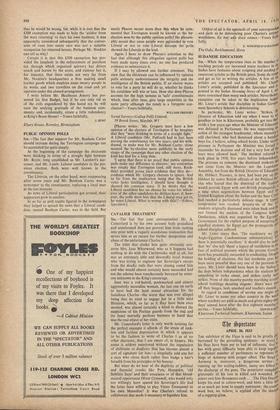SIR, — When the temperature rises or the number 01 teaching periods
are increased many teachers in th,,c Sudan have fantasies about resigning and sending 05 rancorous articles to the British press. Some do reSigi and get as 'far as writing the articles. A few of (ht articles are accepted and published. Mr. Chariot Lister's article, published in the Spectator and rr printed in the Sudan Morning News of April 1, more restrained than many such articles. Nevertheless exception can be taken to the implication bebitd Mr. Lister's article that discipline in Sudan GoverIc ment Secondary Schools is deteriorating. In particular, Mr. Lister writes : 'Strikes, 6° Director of Education told me when I went to sfl goodbye to him in Khartoum, probably got into teat stride a few years ago when the Minister of Education was defeated in Parliament. He was supporting (11° action of the strongest headmaster, whose memory still cherished, who had dismissed about a huncced boys for, 1 believe, selling school books. Under terrific pressure in Parliament the Minister was forced t° reconsider his decision and all but a very few of itic boys were allowed back.' The incident referred t° took place in 1950, five years before independeitcc The pressure to reinstate the dismissed students did not come from the Minister nor the Legislative Assembly, but from the British Director of Education' Mr. Hibbert. Pressure., in turn, had been put on Mr' rsc Hibbert by senior British officials of the Political., ti vice who feared that the dismissal of the students would provide Egypt with anti-British propaganda 3' a time when negotiations between Egypt and tile, United Kingdom about the Sudan and the Suez Canal 113' had reached a particularly delicate stage. A tyr compromise was reached. Seventy-six of the 119 students originally dismissed were taken back and dle rest formed the nucleus of the Congress School Omdurman, which was organised by the Egypt' Government for the explicit purpose of accepting 61,1 expelled students. So Egypt got the propaganda an school discipline suffered. Mr. Lister states that, `The machinery, we [lbc Anglo-Egyptian Condominium administration] left them is potentially excellent' It should also be noted that `we' also left `them' a legacy of vacillation in tea face of political pressure which the present Govern' ment has practically succeeded in eradicating. DesPilfr the holding of elections, this last academic year has been more peaceful than any one of the previous 10 years. Mr, Lister should have been in the Sudan the days before independence when the students had something to strike about, and strikes really we° strikes. None of this mamby-pamby marching around school buildings shouting slogans : doors were 0111 off their hinges, beds smashed and teachers stoned, In regard to conditions of service one might asl‘ Mr. Lister to name any other country in the world where teachers are paid as much and given eighty-foil days' annual leave after the first eighteen months °f
service.—Yours faithfully,




























 Previous page
Previous page